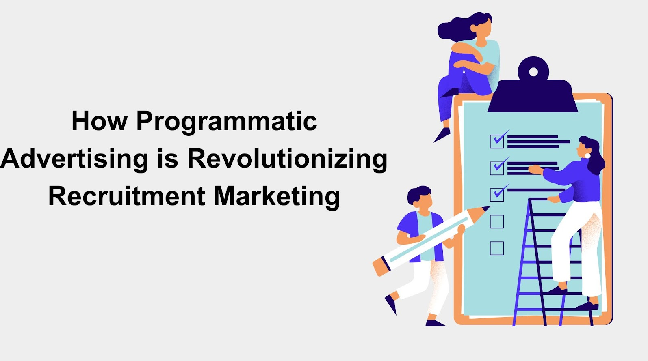Recruitment marketing has evolved significantly over the past few years, driven by advancements in technology and the increasing demand for top-tier talent. Traditional methods of job marketing are no longer sufficient to attract the right candidates in a competitive job market. This is where programmatic marketing steps in, revolutionizing the way companies approach recruitment marketing.
By leveraging sophisticated algorithms and data-driven strategies, programmatic marketing agency is transforming how businesses target, engage, and attract potential employees. In this blog, we will delve into how programmatic marketing is revolutionizing recruitment marketing, highlighting its benefits, strategies, and practical applications.
Leveraging Technology for Efficient and Effective Hiring
The competition for top-tier talent is fiercer than ever, and traditional job marketing methods often fall short in reaching the right candidates effectively. Programmatic marketing leverages advanced algorithms and data-driven techniques to refine and enhance recruitment efforts. Some of the top-rated practices followed by programmatic marketing include:
1. Precision Targeting
Programmatic marketing allows for highly precise targeting, ensuring that job ads reach the right audience. By utilizing data-driven algorithms, these systems can analyze user behavior, demographics, and online activity to place ads in front of potential candidates who are most likely to be interested and qualified.
According to a study by ERE Media, programmatic marketing can reduce cost-per-applicant by up to 30% compared to traditional job marketing methods. This precision targeting reduces the wastage of marketing budgets on irrelevant audiences. For instance, if you’re looking to hire software developers, programmatic marketing can ensure your ads are shown to individuals with relevant skills and experience, rather than a general audience. This targeted approach leads to higher quality applications and a more efficient hiring process.
2. Automation and Efficiency
The automation aspect of programmatic marketing is a game-changer for recruitment marketing. Instead of manually placing ads on different job boards and social media platforms, programmatic marketing platforms automate this process. This not only saves time but also ensures that the ads are optimized for performance.
By automating the ad placement process, recruiters can focus on other critical aspects of their job, such as screening candidates and conducting interviews. Automation also allows for real-time adjustments based on ad performance, ensuring that the budget is allocated to the best-performing channels. Automating recruitment marketing can save substantial time and resources for your company.
3. Data-Driven Decisions
Programmatic marketing agency utilize vast amounts of data to inform their ad placement strategies. This data-driven approach allows for continuous optimization and improvement of ad campaigns.
Recruiters can access detailed analytics and insights, such as click-through rates, application rates, and cost-per-hire metrics. These insights help recruiters understand which channels and strategies are most effective, allowing them to make informed decisions and adjustments to their campaigns.
A report by LinkedIn found that data-driven recruiting strategies can lead to a 50% increase in the quality of hires.
4. Enhanced Candidate Experience
A seamless and engaging candidate experience is crucial for attracting top talent. Programmatic marketing enhances the candidate experience by delivering relevant job ads to the right people at the right time.
Candidates are more likely to engage with job ads that are tailored to their interests and career goals. By providing a personalized experience, programmatic marketing helps build a positive impression of the employer brand, making candidates more likely to apply and stay engaged throughout the hiring process.
5. Cost-Effectiveness Programmatic Marketing
One of the major advantages of programmatic marketing is its cost-effectiveness. By targeting the most relevant audiences and optimizing ad placements, companies can achieve better results with lower budgets.
Programmatic marketing platforms often operate on a pay-per-click or pay-per-application model, ensuring that companies only pay for the results they receive. This performance-based pricing model helps maximize the return on investment (ROI) for recruitment marketing.
According to the Talent Board, companies using programmatic marketing report a 25% increase in recruitment ROI compared to traditional methods.
6. Real-Time Analytics
Programmatic marketing platforms provide real-time analytics and reporting, allowing recruiters to track the performance of their ad campaigns continuously. This real-time feedback loop is invaluable for making timely adjustments and ensuring that the campaigns are meeting their objectives.
Recruiters can quickly identify which ads are performing well and which are not, enabling them to reallocate budgets and optimize strategies on the fly. This agility ensures that recruitment campaigns remain effective and efficient throughout their duration. Real-time analytics has the potential to improve the responsiveness and effectiveness of your recruitment marketing.
7. Scalability
Programmatic marketing agency offer unparalleled scalability for recruitment campaigns. Whether you’re hiring for a single position or multiple roles across different locations, programmatic platforms can scale your ad placements accordingly.
This scalability ensures that your recruitment efforts can grow with your company. As your hiring needs increase, programmatic marketing can handle the expanded scope without a corresponding increase in manual effort, making it a scalable solution for growing businesses.
8. Improved Quality of Applicants
By targeting the right audience and optimizing ad placements, programmatic marketing improves the quality of applicants. Higher quality applications mean that recruiters can spend more time with candidates who are likely to be a good fit for the role.
This focus on quality over quantity leads to more successful hires and reduces the time-to-fill metric, which is a critical performance indicator for recruitment teams.
9. Integration with Existing HR Tools
Many marketing platforms integrate seamlessly with existing HR tools and applicant tracking systems (ATS). This integration streamlines the recruitment process by ensuring that all candidate data is centralized and easily accessible.
By integrating programmatic marketing with HR tools, recruiters can manage their entire recruitment process from a single platform, improving efficiency and reducing the chances of errors or data loss.
Companies that integrate their recruitment marketing with HR tools report a 40% improvement in their overall hiring efficiency, according to a study by Bersin by Deloitte.
10. Enhanced Employer Branding
Effective recruitment marketing goes beyond filling positions; it also involves building a strong employer brand. It allows companies to showcase their brand consistently across multiple channels, enhancing their visibility and reputation as an employer of choice.
A strong employer brand attracts top talent and differentiates a company from its competitors. By using this marketing to promote their values, culture, and benefits, companies can build a positive and lasting impression among potential candidates.
Concluding Remarks
Programmatical marketing is transforming recruitment marketing by providing precision targeting, automation, data-driven decisions, and real-time analytics. These benefits lead to cost-effective campaigns, improved candidate experiences, and higher quality applicants.
By leveraging the power of programmatic marketing agency you can scale your recruitment efforts and enhance employer branding. As the recruitment landscape continues to evolve, embracing programmatic marketing will be crucial for staying competitive and attracting the best talent. Take the next step and explore how you can revolutionize your recruitment marketing strategy today.













